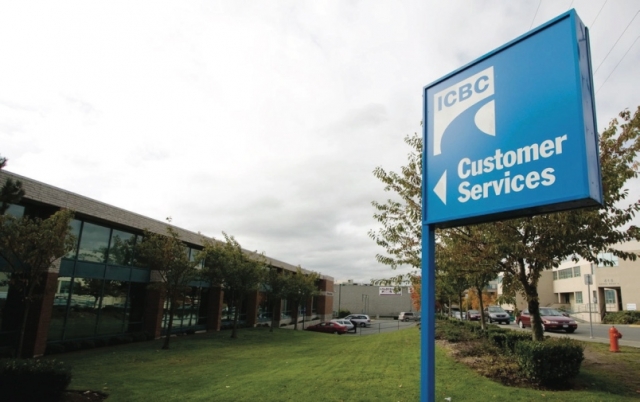ICBC applies for rate hike to deal with escalation of vehicle crashes
The Insurance Corporation of BC is seeking a rate increase of $3.50 per month for basic coverage due to an escalation in the number of crashes, the number of claims being filed and the cost of settling those claims.
The increase was announced in a media release by ICBC Thursday.
““We certainly don’t like to have to ask our customers to pay more but these external pressures are very real and they have created a perfect storm which we are struggling to hold off,” said Mark Blucher, ICBC’s president and CEO in the media release.
“We’ve worked hard to get this rate increase lower than last year’s but the amount of basic premiums we collect will still not cover the increasing amount we’re paying out in basic claims costs.”
The release said provincial insurance corporation is asking the B.C. Utilities Commission to approve a 4.9 per cent rate increase.
“We certainly don’t like to have to ask our customers to pay more but these external pressures are very real and they have created a perfect storm which we are struggling to hold off,” Mark Blucher, president and CEO of ICBC said in a written release.
ICBC is filing an application with the British Columbia Utilities Commission, Aug. 25 to ask for the 4.9-per cent rate hike, effective Nov. 1. Last year ICBC raised rates by 5.5 per cent.
Blucher said the number of vehicle crashes across B.C. rose 15 per cent between 2013 and 2015.
The number of claims being filed and the cost of settling those claims:
-
Rapid increase in the number of reported crashes: The number of crashes across B.C. jumped by 15 per cent in two years from 260,000 in 2013 to 300,000 in 2015.
-
Subsequent growth in reported vehicle damage claims: More vehicle damage claims are being reported to ICBC than ever before – 232,300 over the last 12 months alone (July 2015 to June 2016) which is 23,700 more than just two years ago and an increase of 11 per cent.
-
Higher vehicle repair costs: Our vehicles today are more reliant on technology and expensive materials than ever before which is compounded by an adverse U.S. dollar exchange rate. ICBC’s vehicle damage repair costs contributed to a 17 per cent increase in vehicle damage costs in just one year (2014 to 2015) to a total of $1.36 billion.
-
Staggering rise in the number of people being injured per crash: Despite the fact that vehicles today are much safer, the number of injury claims per 100 crashes has jumped by a staggering 32 per cent over the last six years.
-
A concerning trend in injury claims: After a few years of relative stability, the number of injury claims reported to ICBC has skyrocketed – 67,300 new injury claims over the last 12 months alone (July 2015 to June 2016) which is 8,000 more than just two years ago and an increase of 14 per cent.
-
Injury claims now cost more than $2 billion every year: The increasing number of injury claims has been exacerbated by the cost of settling these claims – totalling $2.4 billion in 2015 alone. That’s an increase of approximately $900 million, or 60 per cent, over the last seven years.
-
Investment income can no longer provide much relief: In recent years, ICBC’s strong investment income has been able to partially offset claims costs pressures and help mitigate rate increases. However, like many companies, ICBC is facing increasingly challenging investment markets with interest rates at historically low levels. In 2015, ICBC’s investment income was $920 million at year-end but at the mid-way point in 2016, it sat at just $44 million.
To cover the costs of more crashes and more claims, ICBC would need to charge every customer approximately an extra $130 a year, which would have required a rate increase of 15.5 per cent.
In partnership with government, ICBC has implemented various initiatives aimed at alleviating the escalating pressures on auto insurance rates in British Columbia:
-
Transfer of $472 million in optional income and capital: Rather than asking customers to pay $100 more a year, ICBC is making up the shortfall through government-directed transfers from its optional insurance business. These transfers help make a positive difference to this year’s basic rate application but also help to rebuild ICBC’s basic capital, which has come under increasing pressure in recent years.
-
A business transformation with major savings: ICBC’s in the final stage of a business transformation program which has modernized its business, all paid for through optional capital with forecasted savings of approximately $90 to 100 million every year.
-
Stepping up efforts to combat fraud: ICBC has stepped up its efforts against exaggerated and fraudulent claims which could be costing hundreds of millions per year in additional claims costs. ICBC’s commitment to improving its detection and enforcement on fraud is expected to reduce its basic insurance claims costs by $21 million for policies written over the next year, which has helped lower this year’s basic rate application for customers.
-
Continuing the fight against distracted driving: Distracted driving is now responsible for approximately one quarter of all fatal crashes in B.C. Government renewed its focus this year with tougher penalties and ICBC will continue to support this fight with a new public education campaign in September.
-
Increasing front-line customer service: ICBC’s addressing the challenge of the increasing number of injury claims being reported head-on, by hiring approximately 160 new claims staff with a further 180 additional claims staff to be added later this year. This is in addition to improving customers’ access to benefits, including access to the medical treatments they need immediately after they report their claim.
-
Reducing management numbers and compensation: ICBC’s executive team has decreased from 11 members in 2012 to just eight today, along with significant other staffing and compensation cuts from its management group. In 2015, total executive compensation was 46 per cent lower than it was in 2011.
-
Modernizing supply management practices: ICBC’s also taking several steps to modernize its supply management practices to help ensure the best value for customers.
“It would not be right to increase our customers’ rates without first doing everything we can to hold off these rising external cost pressures,” said Blucher.
“We’re looking at how other jurisdictions are dealing with some of the same challenges. However, all of the efforts we’re making won’t make the underlying causes of the rate increase go away on their own.
“We also need help from all British Columbians to help keep our roads safe. By driving safely you can help lower our claims costs and directly lower the rates you pay.”
ICBC said the rising number of crashes, injuries and the cost of these claims, is also putting pressure on ICBC’s optional insurance rates as liability payouts above $200,000 and collision and comprehensive coverage for your vehicle are covered under optional insurance.
The average personal insurance customer who purchases optional extended third-party liability coverage – plus collision and/or comprehensive insurance – can expect to pay an additional $5 per month for their full basic and optional coverage.


























